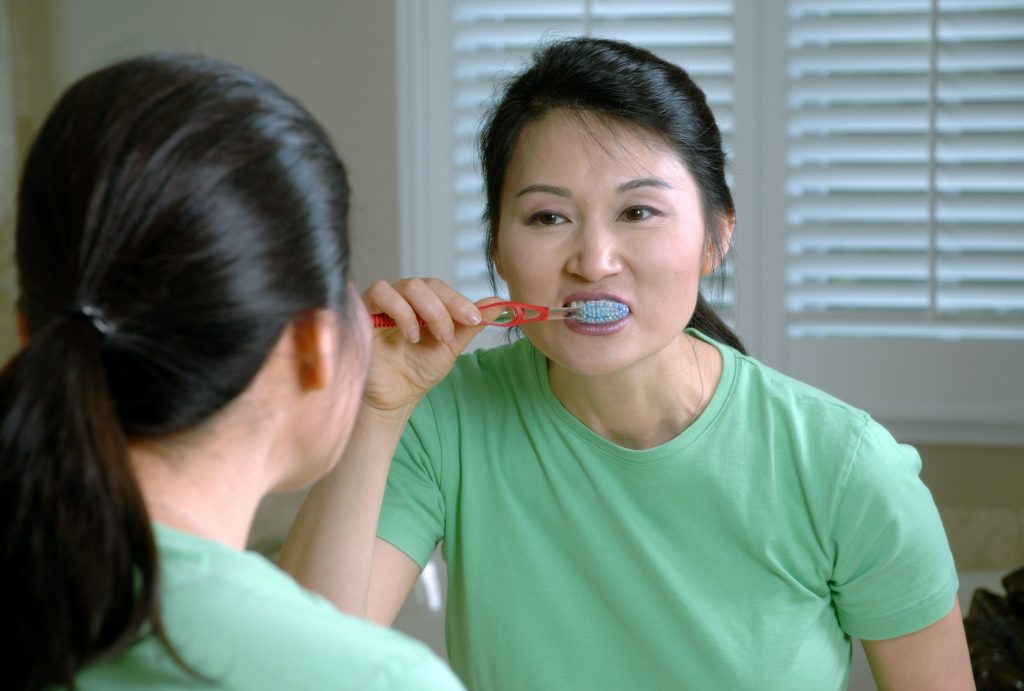
One of the first things we teach our little ones as they begin to understand how to take care of themselves is the importance of oral hygiene. Brushing their teeth becomes a ritual that they quickly get used to, and sometimes look forward to!
But if you’re not aware of it, you could be instilling bad teeth brushing habits in your kids while they’re young, and you’re probably doing the same things yourself!
There are lots of mistakes that people make when it comes to proper brushing habits. Check over these 10 common errors to make sure you’re giving your teeth the care they need and that you’re teaching your children the right way!
Are You Guilty of These Bad Teeth Brushing Habits?
1. Using the wrong bristle. Most people do just fine with a soft bristle, but one of the most popular purchases is the medium. When you use a harder bristle, they could damage the enamel, roots, or gum line in your mouth.
2. Not brushing thoroughly. Do you have a brushing routine that you like to use when you take care of your teeth? Maybe a song that you sing or a multitasking activity you always repeat? Well, make sure that whatever you do, it’s for a solid two minutes
The common error is thinking 30- or 60-seconds is enough for your mouth to be thoroughly cleaned. Dentists recommend two minutes, and there are lots of timers you can use to ensure you’re scrubbing for the whole time.
3. Not brushing often enough. Technically, dentists suggest you brush after every meal. The sugars and bacteria from the food sit on your enamel, which isn’t a good thing. But at a minimum, you must brush twice a day, typically in the morning to get rid of the nighttime accumulation of bacteria and at night to eliminate the day’s buildup.
4. Brushing in the wrong direction. Make sure you brush in a circular motion to remove any bacteria hiding under the surface of your gum line.
5. Neglecting the same spot. If you’re always brushing the same routine, you may be giving the best of your brushing energy to certain places and then skipping out on others. Try brushing with different starting points each time.
6. Forgetting to brush your tongue. Yes, your tongue. Bacteria builds up on this vital organ and then spreads to your teeth. Keeping your tongue cleaned helps reduce bad breath and helps your teeth stay healthy.
7. Only brushing the outside of the teeth. When you brush in circular motions, you’re doing a good job at catching the outside enamel. But the back of your teeth are important, too. Make sure you hold the toothbrush properly to reach those backsides.
8. Avoiding brushing because it hurts. Unfortunately, if your gums or teeth are hurting, that may be when they need the most care. Make sure you brush with a soft bristle and don’t neglect this important habit, but call the dentist, too! Something is going on inside your mouth and it needs to be addressed before it becomes a serious problem.
9. Improperly caring for your toothbrush. Have you been sick recently? Are you on the mend? Well, if you’re not cleaning your toothbrush properly, you might be taking those germs and recycling them right back into your body. Make sure you clean the toothbrush after every brushing. Even better, follow these professional tips to disinfect your brush frequently.
10. Keeping a toothbrush too long. You can only clean and disinfect a toothbrush so much. Eventually, those bristles just aren’t going to do the job anymore. Even if the bristles hold out, they’ve collected so many germs you should just get a new one and start over. Dental experts recommend a new toothbrush every three months, but if you’ve been seriously sick, get a new one when you are on the mend to avoid getting those germs again.
Yet Another Dental Mistake People Make
You could be making those teeth-brushing mistakes, but you might be making an even bigger one if you’re not visiting the dentist at least twice a year for preventative checkups. Your dentist can quickly catch any problems that are starting before they become painful, possibly expensive, issues!
Call Eriks Dental today to schedule your regular cleaning and checkup. If you’re already having pain while brushing, or anything else is concerning you with your oral health, make sure you let the staff know when you call.
Your brushing habits are your job; taking care of your checkups, preventative care, and fixing the problems are ours!
